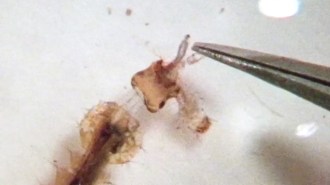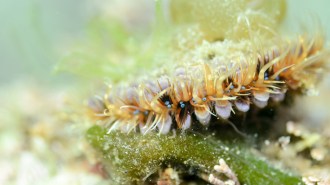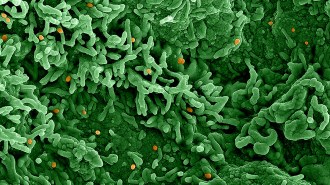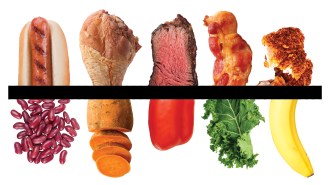Search Results for: Dogs
Skip to resultsCan’t find what you’re looking for? Visit our FAQ page.
4,010 results for: Dogs
-
 Health & Medicine
Health & MedicineThe first known monkeypox infection in a pet dog hints at spillover risk
A person passed monkeypox to a dog. Other animals might be next, allowing the virus to set up shop outside of Africa for the first time.
-
 Animals
AnimalsVideo shows the first red fox known to fish for food
Big fish in shallow water are easy pickings for one fox — the first of its kind known to fish, a study finds.
By Freda Kreier -
 Animals
AnimalsVideo captures young mosquitoes launching their heads to eat other mosquitoes
New high-speed filming gives a first glimpse of mosquito hunting too fast for humans to see.
By Susan Milius -

Dogs are great sniffers. A newfound nose-to-brain connection helps explain why
A new anatomical description of how smell works in a dog brain shows why they’re such good sniffers.
-
 Space
Space‘The Milky Way’ wants you to get to know your home in the universe
In a new ‘autobiography,’ the Milky Way tells its own story with the help of astrophysicist Moiya McTier.
-
 Animals
AnimalsEd Yong’s ‘An Immense World’ reveals how animals perceive the world
The book showcases the diverse sensory abilities of other animals and how their view of the world is different from our own.
-
 Health & Medicine
Health & MedicineTrained dogs sniff out COVID-19 as well as lab tests do
Dogs can be trained to sniff out COVID-19 cases. They’re overall as reliable as PCR tests and even better at IDing asymptomatic cases, a study suggests.
-
 Animals
AnimalsDog breed is a surprisingly poor predictor of individual behavior
Despite the popular conviction that dog breeds are associated with specific traits, breed accounts for only 9 percent of behavioral differences.
By Anna Gibbs -
 Health & Medicine
Health & Medicine4 answers to key questions about the monkeypox outbreak
Monkeypox has cropped up around the world, but it doesn’t spread easily like the coronavirus and most people probably don’t need to be concerned.
-
 Humans
HumansEating meat is the Western norm. But norms can change
A meat-heavy diet, with its high climate costs, is the norm in the West. So social scientists are working to upend normal.
By Sujata Gupta -
 Animals
AnimalsHow do we know what emotions animals feel?
Animal welfare researchers are studying the feelings and subjective experiences of horses, octopuses and more.
-
 Archaeology
ArchaeologyAncient ‘smellscapes’ are wafting out of artifacts and old texts
In studying and reviving long-ago scents, archaeologists aim to understand how people experienced, and interpreted, their worlds through smell.
By Bruce Bower